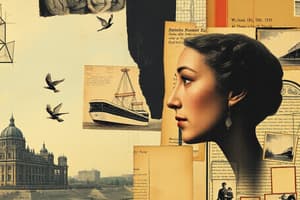Podcast
Questions and Answers
Which of the following is an example of a primary source?
Which of the following is an example of a primary source?
- An eyewitness report of the event (correct)
- An article written by a historian about an event
- A history textbook summarizing events from the past
- A letter written by someone reflecting on the event years later
What was the purpose of the Mayflower Compact?
What was the purpose of the Mayflower Compact?
- To establish a monarchy in the Plymouth colony
- To consult each other about laws for the colony and promise to work together to make it succeed (correct)
- To outline the rules for parliamentary elections
- To declare independence from the Mother Country
What is the main idea behind Mercantilism?
What is the main idea behind Mercantilism?
- A country's strength is measured by the amount of gold it has and it should sell more than it buys (correct)
- A country's strength is measured by the amount of goods it produces
- Colonies exist for the benefit of native inhabitants
- A country should buy more than it sells to maintain economic stability
What is a defining characteristic of a Democracy?
What is a defining characteristic of a Democracy?
Which event effectively expelled the French from North America?
Which event effectively expelled the French from North America?
Who was the King of England who refused the Olive Branch Petition and ultimately led to the final break with the colonies?
Who was the King of England who refused the Olive Branch Petition and ultimately led to the final break with the colonies?
Where were the opening shots of the American Revolution fired?
Where were the opening shots of the American Revolution fired?
Who wrote the pamphlet 'Common Sense' to convince colonists that it was time to become independent from Britain?
Who wrote the pamphlet 'Common Sense' to convince colonists that it was time to become independent from Britain?
What was the trade route between Europe, West Africa, and the West Indies called?
What was the trade route between Europe, West Africa, and the West Indies called?
Who was the leader of the Continental Army and later became the first President of the United States?
Who was the leader of the Continental Army and later became the first President of the United States?
Flashcards are hidden until you start studying
Study Notes
Primary Sources
- Diaries, letters, and other original documents written by individuals who lived during a historical event are examples of primary sources.
Mayflower Compact
- Signed in 1620, it was an agreement among the Pilgrims establishing a framework of government for Plymouth Colony.
Mercantilism
- An economic theory that promotes a nation's wealth and power through the accumulation of gold and silver, and a favorable balance of trade.
Democracy
- A system of government in which power is vested in the people, who rule either directly or through freely elected representatives.
French and Indian War
- The Treaty of Paris (1763) effectively expelled the French from North America, marking the beginning of British dominance.
American Revolution
- King George III refused the Olive Branch Petition, ultimately leading to the final break with the colonies.
- The opening shots of the American Revolution were fired in Lexington and Concord.
Influential Figures
- Thomas Paine wrote the pamphlet 'Common Sense' to convince colonists that it was time to become independent from Britain.
- George Washington was the leader of the Continental Army and later became the first President of the United States.
Trade and Exploration
- The trade route between Europe, West Africa, and the West Indies was called the Triangular Trade.
Studying That Suits You
Use AI to generate personalized quizzes and flashcards to suit your learning preferences.




